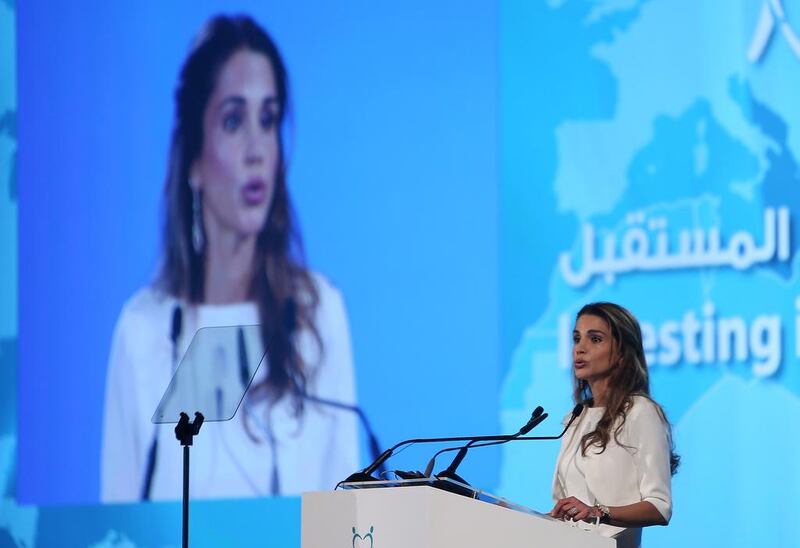SHARJAH // The UN has urged Arabian Gulf countries to take in Syrian refugee families and give access to education, health and welfare.
“True and effective burden-sharing also means borders beyond the neighbouring states must be open for those fleeing violence and war,” said Antonio Guterres, UN High Commissioner for Refugees, at a two-day conference in Sharjah.
The summit on refugee children was organised by the UNHCR and its Eminent Advocate, Sheikha Jawaher bint Mohammed Al Qasimi, also founder of the Big Heart Campaign for Syrian children.
Attending the forum was Queen Rania of Jordan, whose country hosts more than 1 million Syrians.
“I had important discussions with the Emirates and I hope a lot of progress will be made every-where,” Mr Guterres said. “The protection of Syrian refugees can’t be only the responsibility of Jordan, Turkey, Lebanon and Iraq.”
Of the more than 51 million refugees around the world, 2.6 million are children and adolescents in the Mena region, the UN says.
“Saudi Arabia is providing Syrian refugees with access to schools and health centres free of charge,” Mr Guterres said. “They are also enacting legislation for work permits.”
Investing in the Future: Protecting Refugee Children in Middle East and North Africa, was called in response to the alarming levels of global displacement recorded by the UNHCR last year.
Mr Guterres said he was also reaching out to Europe for assistance.
“Just last week I addressed the European council of ministers of justice and home affairs in Luxembourg and insisted on the need to offer more legal avenues for Syrian refugees to reach Europe, including through resettlement and humanitarian admission, family reunification or more flexible visa policies,” he said.
“And during a visit to this region only last month, I had the opportunity to advocate for the wellbeing of Syrian refugees in Saudi Arabia and the Emirates.
“It breaks my heart to see Syrian families suffering so much.”
This is the first time such a meeting has been organised in the Middle East and North Africa. It places the UAE at the forefront of drafting a comprehensive plan to protect, shelter and educate the region’s refugee children.
“I had a very constructive decision with the UAE authorities,” Mr Guterres said.
“The most important thing we are discussing is related to the access of Syrian refugees to the health and education systems and other aspects of welfare, to make sure they have a life as close as possible to normalcy.”
Queen Rania said more countries needed to get involved in sharing the burden of refugees.
“Eighty-five per cent of displaced people in the world take refuge in neighbouring developing countries, whose limited economic potential constrains their ability to provide from their resources and income,” she told the conference.
“Still, they open their doors and take in those seeking refuge, sharing the food, security, water, fuel, hospitals, schools and much more. In Jordan, we know this very well.
“The high numbers of Syrian refugees pose a great challenge to us, especially in local host communities, and the world has a major role in supporting all countries hosting refugees because that is a guarantee of our region’s stability.”
Dr Sheikh Sultan bin Mohammed Al Qasimi, Ruler of Sharjah, said support in health and education was important for children, who always bore the brunt of conflicts.
“Conflicts where children are affected aren’t new,” Sheikh Sultan said. “That has led to international and national laws to protect children from attack or aggression.
“But given the changing circumstances, we see a lot more children and women living in harsh conditions or fleeing their homes. Those committing aggression neglect what religion or humanitarian laws say.
“There is an urgent need to support and provide comprehensive rehabilitative care in health and education for children. This will prepare our youth for a better future.”
Big Heart Campaign officials said the aim of the conference was to “increase the impact” of assistance.
The campaign has already raised more than US$14.5 million (Dh53.3m) in aid to help Syrian children since its inception last year.
“Half of all refugees are children, which is a big number, and half of them are not in school,” said Erum Alvie, adviser to the Big Heart Campaign.
“2.6 million refugee children is a big number. One individual country or campaign can’t handle this.
“The purpose is to bring together government representatives from all the host countries and the UAE Government. We want to look at the challenges and find solutions together.”
pkannan@thenational.ae






